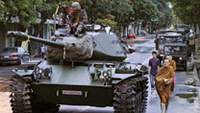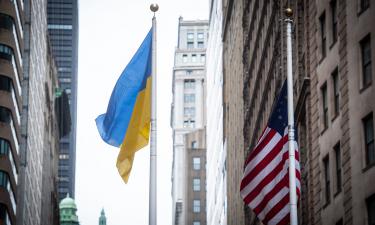International community calls for democracy in Thailand after coup
World leaders and and human rights activists demanded that Thailand swiftly return to democracy Wednesday after Prime Minister Thaksin Shinawatra was ousted overnight in a coup.

Governments across Asia, as well in the U.S. and Britain, issued warnings to their citizens to rethink traveling to Thailand, a major tourist drawcard where tanks and troops now lined the streets of the capital, Bangkok.
The European Union joined the international condemnation of the coup, and in a statement issued by Finland the 25-nation bloc demanded, "that the military forces stand back and give way to the democratically elected political government."
China described the coup as "an internal affair of Thailand" and made no public judgment.
"The friendly relations between China and Thailand will continue to develop," Chinese Foreign Ministry spokesman Qin Gang said in a statement.
Australian Prime Minister John Howard described the coup as a "great disappointment," adding that it was a reminder of an element of Asia's past he had hoped would not return.
"We condemn military coups," Howard told reporters in the northeastern city of Cairns. "They are a throwback to a past I had hoped Asia had emerged from."
Japan also called for the quick restoration of democracy in a country where many top Japanese businesses have factories and affiliates.
Thailand has emerged as a major center of production and logistics for many Japanese automakers and other manufacturers as they build up their international operations, leading to large inflows of direct investment from Japan.
While it was business as usual for most Japanese companies, the coup disrupted some operations.
"We are monitoring the development with serious concern," Japanese Foreign Minister Taro Aso said in a statement.
Indonesia also said it was watching developments in Thailand "with great concern."
Others were adopting a more wait-and-see attitude toward the coup, which occurred amid months of political turmoil and sharp criticism that Thaksin had eroded Thailand's democracy.
"It's really too early to form any hardened judgments," Assistant Secretary of State Christopher Hill told The Associated Press in Washington. U.S. State Department said that officials "are monitoring the situation with concern."
Australia, Britain, Japan, New Zealand, Singapore, Hong Kong and the United States were among countries that advised their citizens already in Thailand to stay indoors, and for those planning trips to reconsider.
Malaysia's Prime Minister Abdullah Ahmad Badawi said he was "shocked" by the coup, but his government had not advised Malaysians to avoid their northern neighbor, Malaysia's Bernama news agency reported.
In Taiwan, the Ministry of Foreign Affairs said the situation in Thailand looked "peaceful overall" but advised its citizens to mind their safety if traveling there.
Thai financial officials attending an annual IMF-World Bank meeting in Singapore were rushing home early Wednesday because of the coup, International Monetary Fund chief Rodrigo de Rato said.
But Thai trade officials continued participating at global trade talks Wednesday at an international summit in the northeastern Australian city of Cairns.
Pakistan, whose President Gen. Pervez Musharraf seized power in a bloodless coup in 1999, was "watching the situation with concern," Islamabad spokeswoman Tasnim Aslam said.
Army Chief Gen. Sondhi Boonyaratklin, who ousted Thaksin while the prime minister was in New York, told national television Wednesday: "we don't have any intention to rule the country and will return power to the Thai people as soon as possible."
The Asian Human Rights Commission joined international civil liberties groups including U.S.-based Freedom House and Human Rights Watch in condemning the coup, the AP said.
"The Royal Thai Army must immediately renounce power and allow for a return to a caretaker civilian government by the most effective and expedient means possible," the commission founded by prominent jurists and human rights activists said in a statement.
It also called on the U.N. General Assembly in New York and the U.N. Human Rights Council in Geneva, both of which are in session, to unconditionally condemn the coup and also call for the restoration of civilian government.
Subscribe to Pravda.Ru Telegram channel, Facebook, RSS!



